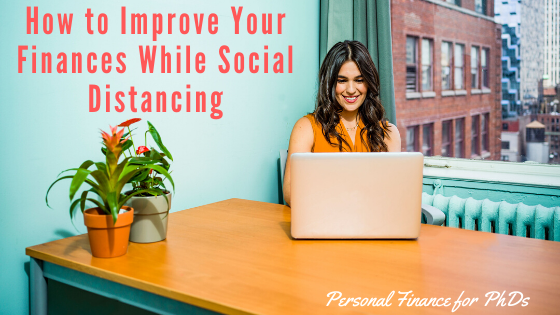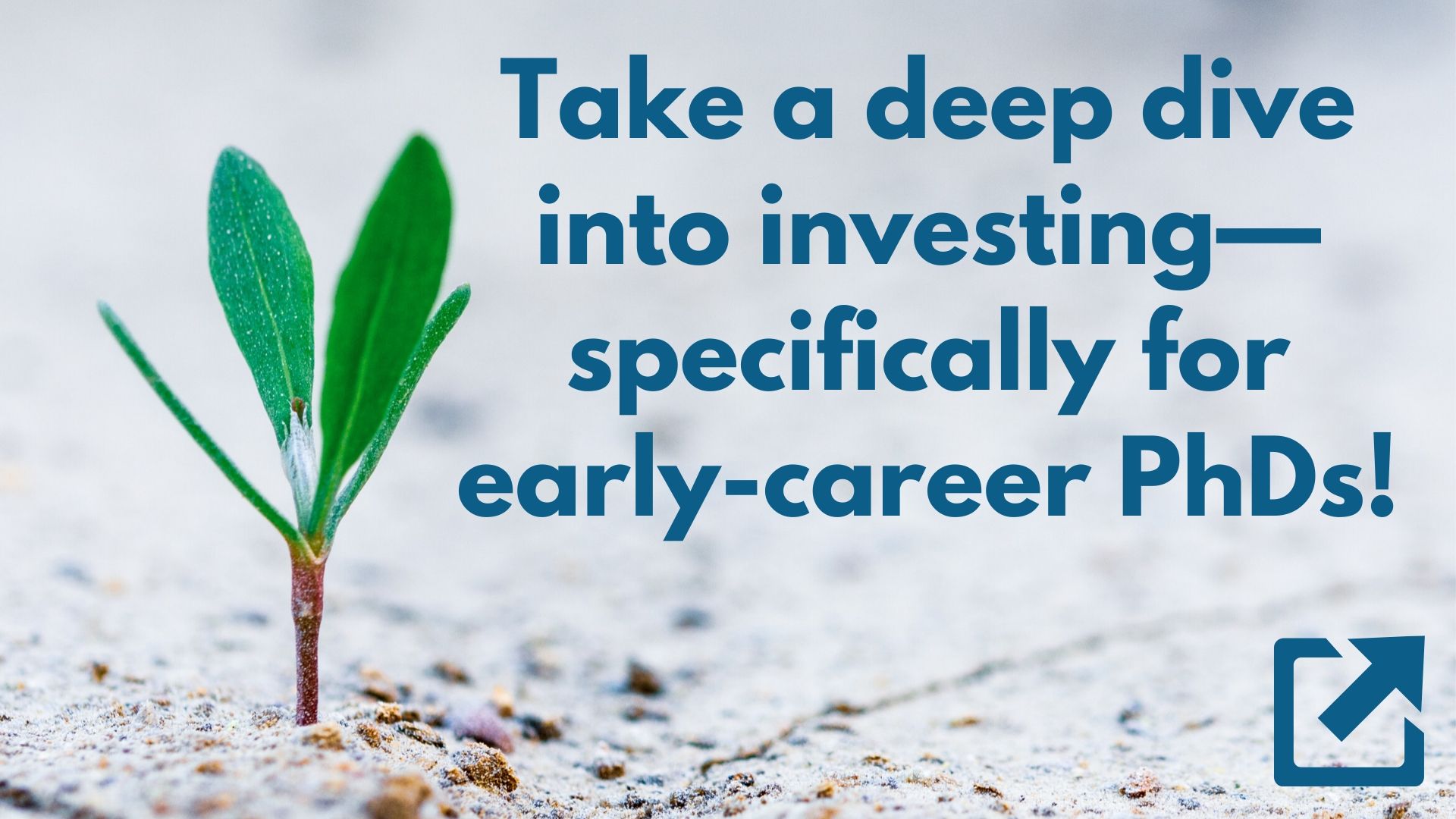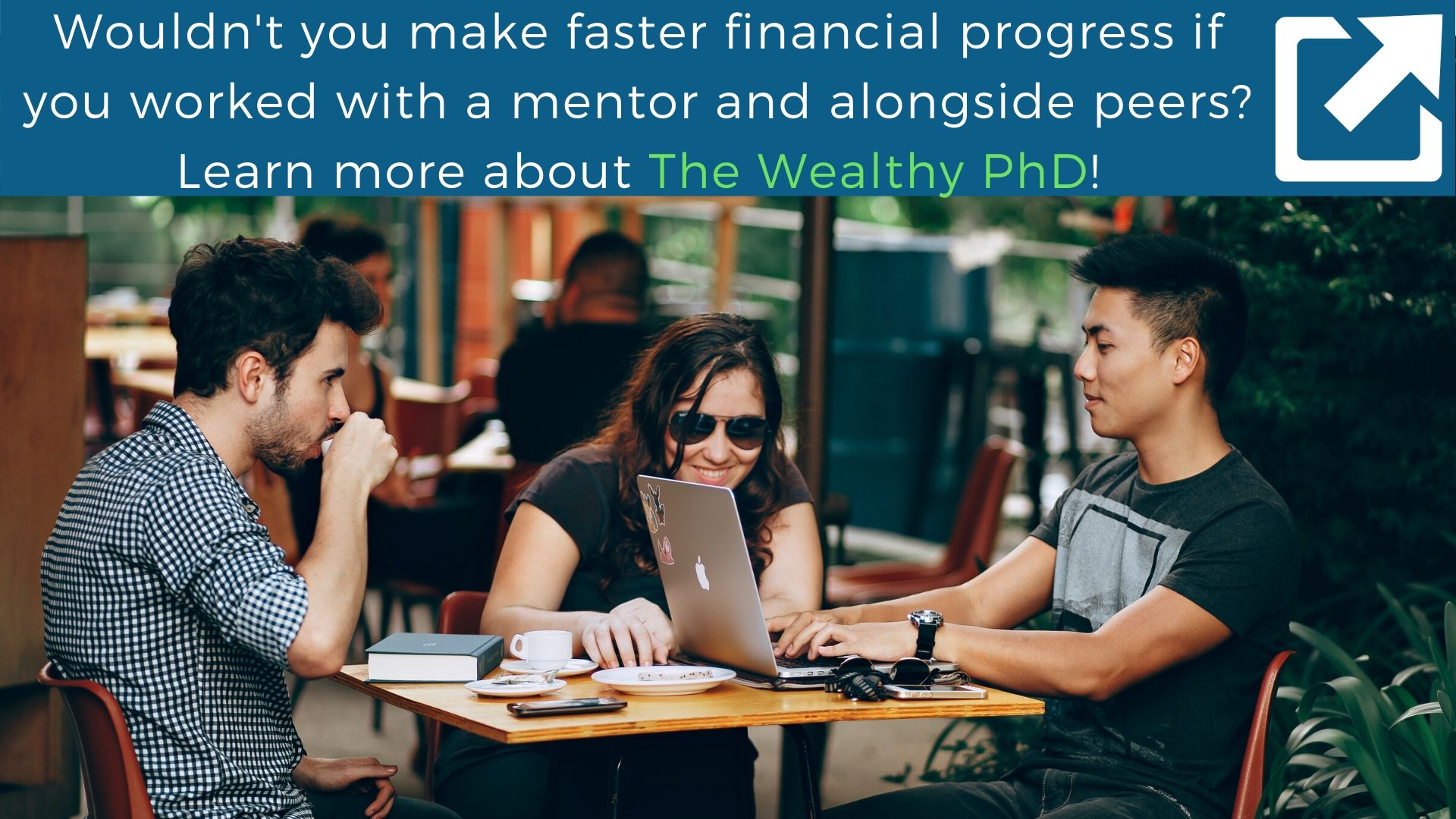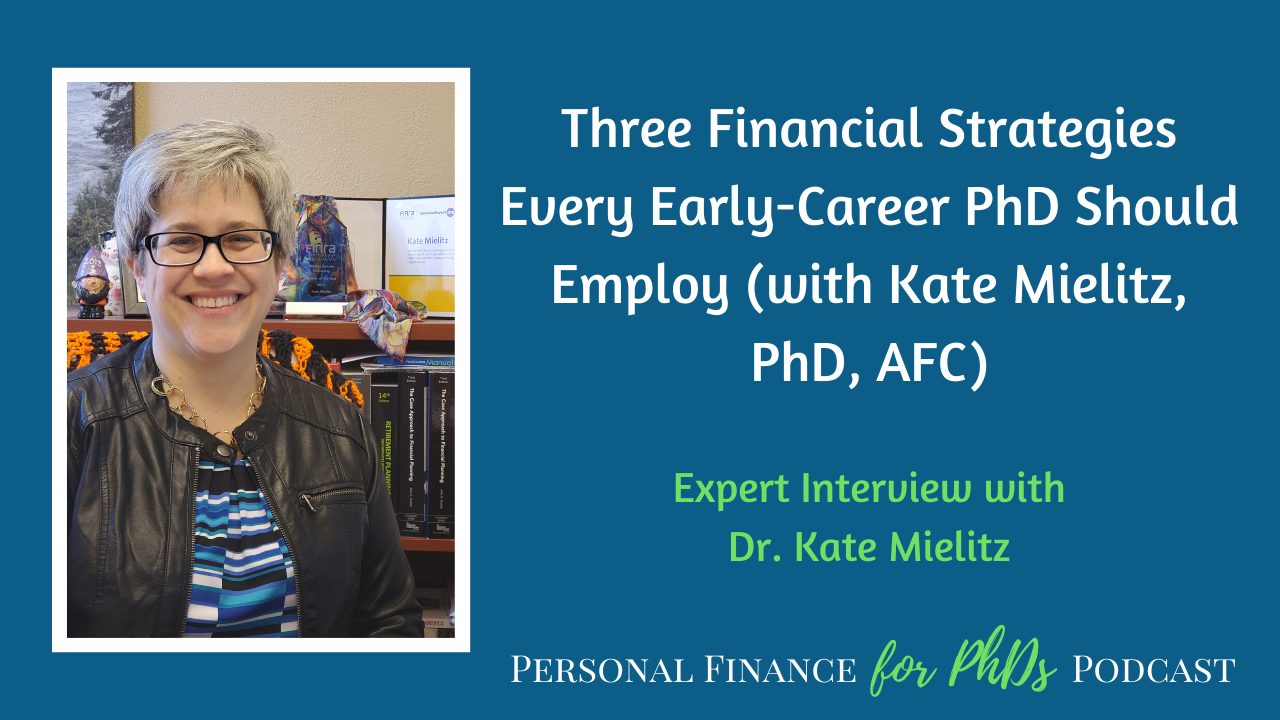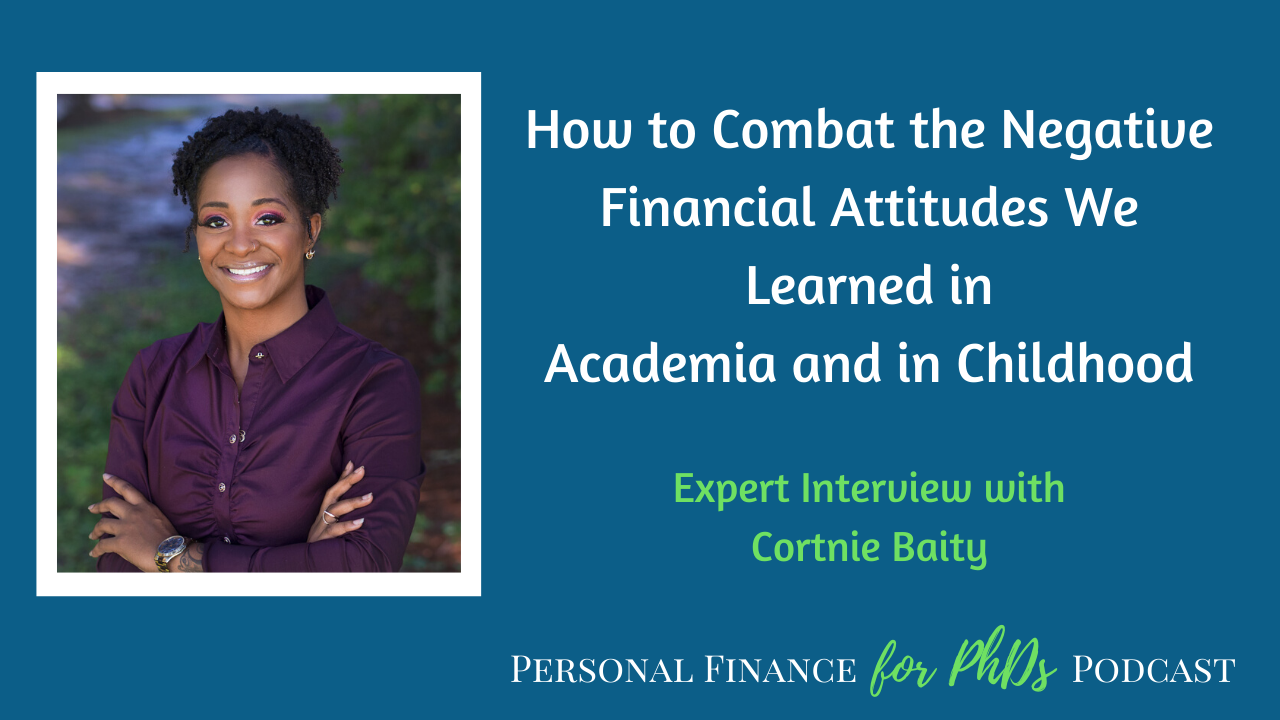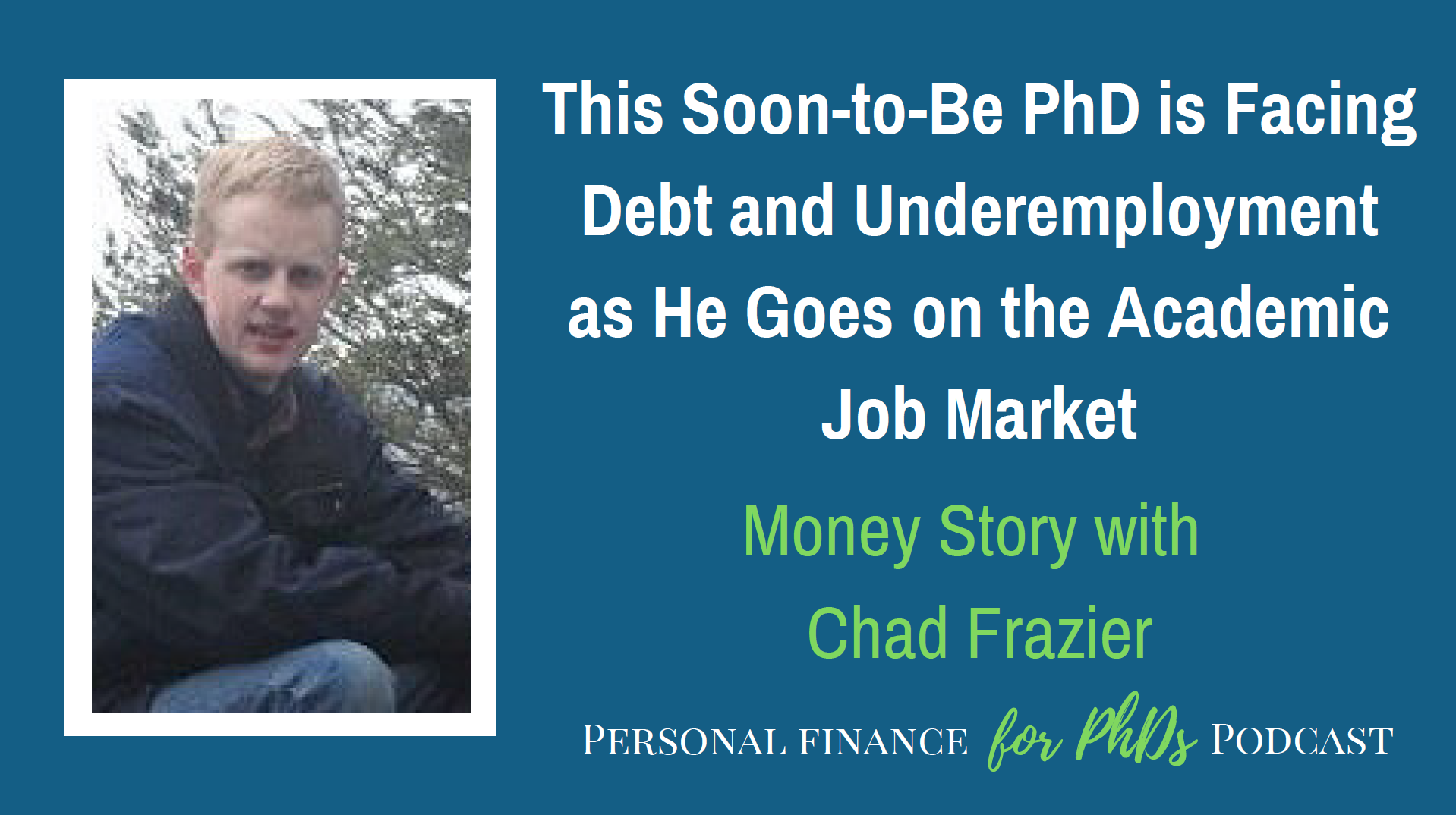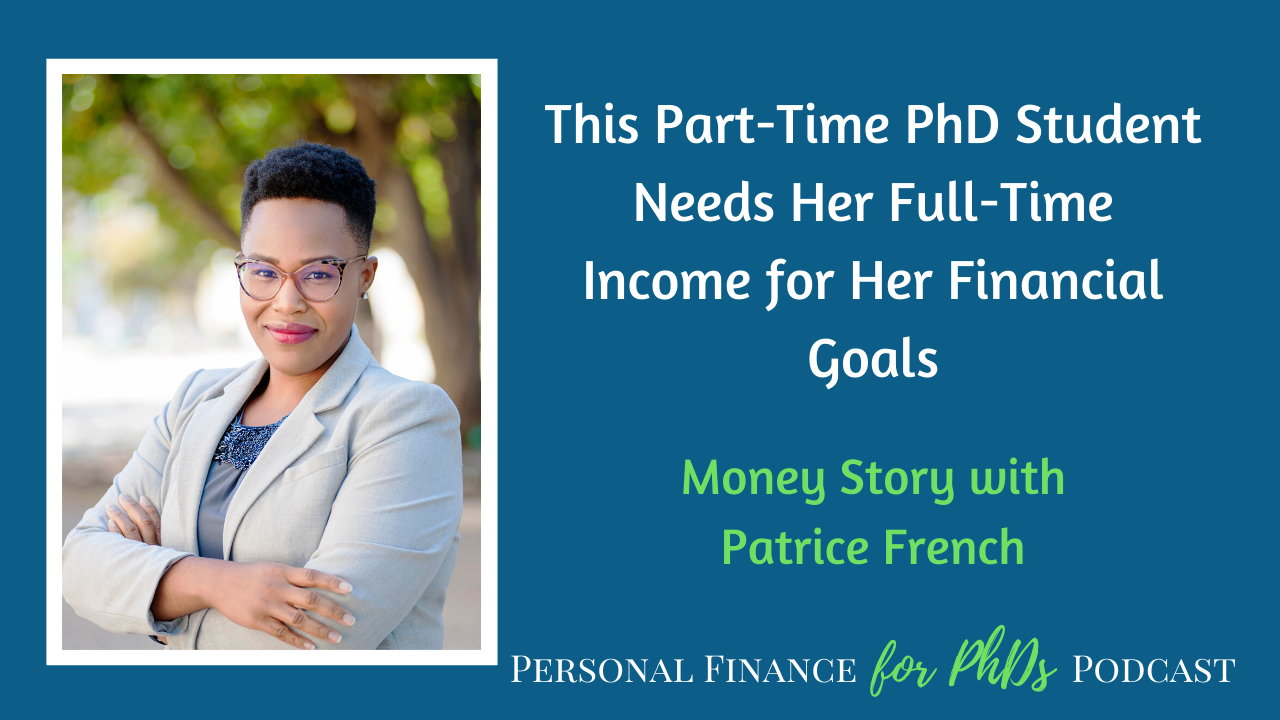In this episode, Emily interviews Dr. Jim Pugh, the founder of ShareProgress and co-host of the Basic Income Podcast. Jim earned a PhD in computer science and subsequently worked for the Democratic National Convention and other progressive groups. He always aspired to start a business, and his post-PhD work experience inspired him to found ShareProgress, a software product and consulting service. Jim describes the evolution of his business, which now brings him sufficient income to support him in San Francisco in exchange for about 5 hours of work per week. Jim’s observations of changes in technology and the workforce while building his business and newfound time freedom drew him to investigating universal basic income.
Links Mentioned in This Episode
- ShareProgress Website
- PF for PhDs, Financial Independence Part 1 (Dr. Gov Worker)
- PF for PhDs, Financial Independence Part 2 (Dr. Gov Worker)
- PF for PhDs: Speaking
- Gusto Payroll Website
- PF for PhDs: Podcast Hub
- PF for PhDs: Subscribe
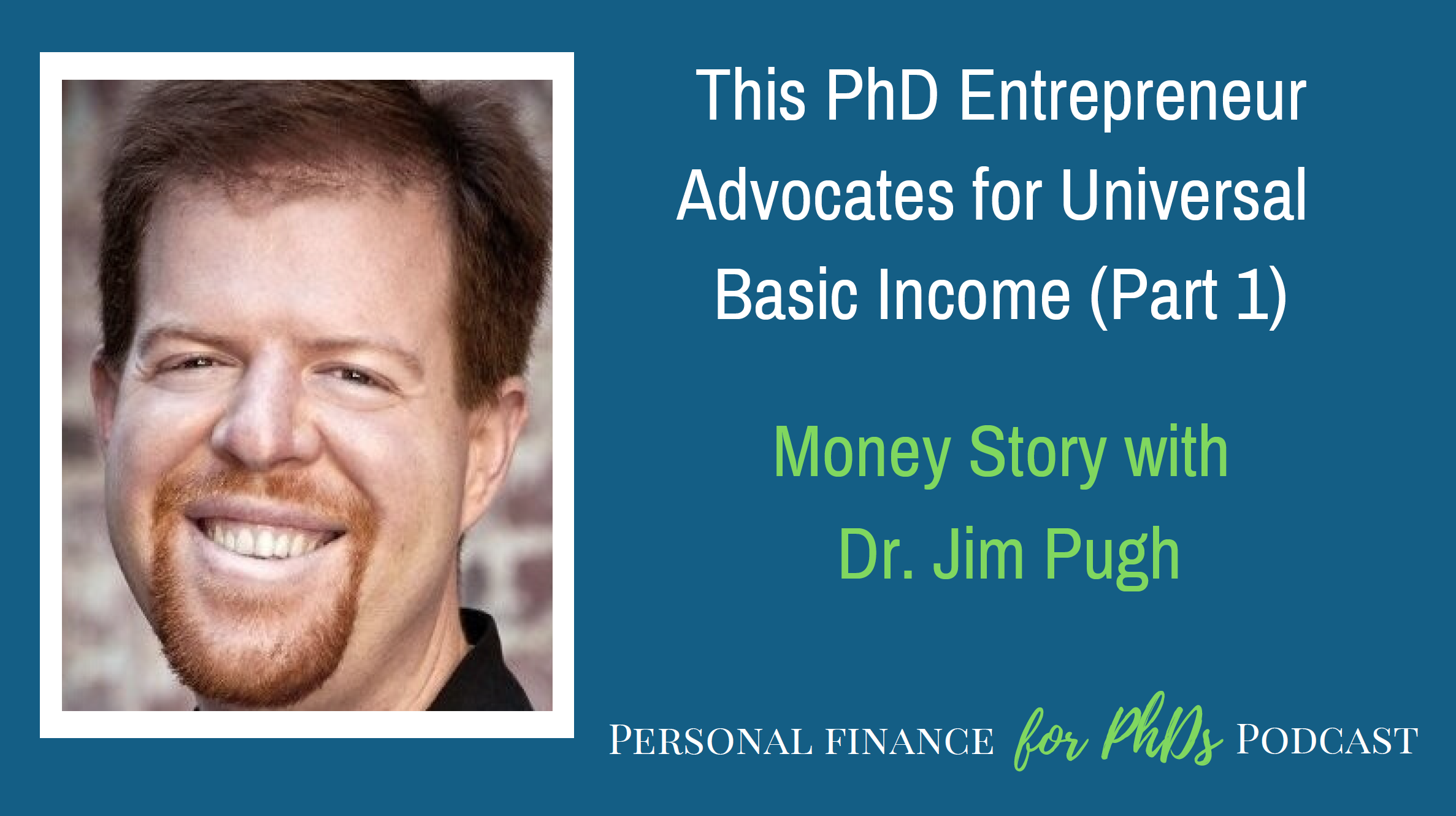
Teaser
00:00 Jim: As you’re doing something, you’ll see many other, adjacent great things to do as well, but that can so easily be a distraction from actually figuring out, “Alright, what is the core of this successful business going to look like?” And if you let yourself be pulled in that direction, it can really detract from your chance of building something big.
Introduction
00:25 Emily: Welcome to the Personal Finance for PhDs podcast, a higher education in personal finance. I’m your host, Dr. Emily Roberts. This is season six, episode one, and today my guest is Dr. Jim Pugh, the founder of ShareProgress and cohost of The Basic Income Podcast. Jim’s doctoral work in computer science and his experience working for the Democratic National Convention inspired him to start ShareProgress seven years ago. In this first half of our interview, we discuss the growth and evolution of his business, which now brings him sufficient income to support him in San Francisco in exchange for about five hours of work per week. Jim’s observations while building his business and newfound time-freedom drew him to investigating universal basic income. Without further ado, here’s the first part of my interview with Dr. Jim Pugh.
Will You Please Introduce Yourself Further?
01:15 Emily: I am delighted to have joining me on the podcast today, Dr. Jim Pugh. It’s a really special episode for me because Jim and I know each other in real life. He is the older brother of a dear friend of mine and my husband’s from college. And we actually had lunch a couple months ago when we were visiting and had gotten into this really interesting conversation about what Jim’s up to these days, the activism that he does. And it was just really exciting and I could see there was a definite PhD angle there, not just because Jim himself has a PhD but also because what he works on has implications for PhDs. So, we will get into all of that in just a few minutes. So, Jim, will you please take a moment and introduce yourself a little bit further to the listeners?
01:53 Jim: Yeah. Well Emily, thanks for having me on the podcast. My background brings together a few different areas. My academic background is in the sciences. I did my undergraduate and doctorate in computer science, specifically robotics, my doctorate. And following that, ended up getting involved in the political world. And so, I spent some time working on the 2008 Obama campaigns, spent a few years in D.C. after continuing political work out there. And then about six, seven years back decided to take honestly experiences on both those fronts to start my own company called ShareProgress, working primarily with political and nonprofit organizations, providing them with tools and other technical support. And then just in the last few years, I started to delve really in on the activism side of things myself and helped to start an organization that does a lot of work around universal basic income doing both advocacy around that topic and also some policy development work in that field.
What Role Did Your PhD Have in Starting Your Business?
02:58 Emily: Yeah. Super, super exciting. Thank you. Clearly, you have a lot of skills and a lot of interesting experiences that you’ve brought to bear on these most recent endeavors. So, kind of backing up slightly to the business that you started, ShareProgress. How did your PhD prepare you for ultimately starting that business? Obviously, you had some work experience after that point before you started it, but how did the PhD specifically prepare you? Or how did it not prepare you very well for that?
03:25 Jim: So, I would say the PhD itself wasn’t terribly relevant for starting that because I was really in a hard research area and was working on algorithms and models that didn’t have any clear path to monetization to turn it into a company. So, that I don’t think was terribly relevant. What was a bit more relevant is I was involved with, at the university I was working with, which is the Institute of Technology in Lausanne, Switzerland. They actually were making a pretty significant investment in cultivating entrepreneurship amongst their students, both undergraduate and graduate. And so there was a program on campus that was talking a lot about that. And so, I feel like there was some stuff I learned through experience with that going through events, and they had various activities that they would organize. And so, I felt like that it was informative in some ways, but it really was very much focused on taking the sort of research you do through your doctoral degree, through your academic work afterwards and turning that into a company. And my company that I ended up starting really didn’t resemble that much at all because that was much more informed by the political work I’d done and seeing what the needs were in that space. So, there were there aspects around “what does it look like to go through that process?” that I would say generally provided me with some guidance. But as far as the specifics, really not much at all.
Jim’s Entrepreneurship Journey
05:02 Emily: Did you have in your mind at that time that you did want to pursue entrepreneurship?
05:08 Jim: I did. That was something from I think pretty early on in college I realized was an area I was quite interested in. And when I was graduating from undergraduate, actually, I kind of had in my head either go to grad school or do a startup. I didn’t have an idea for a startup, so I said, “Well I guess it’s grad school.” But it definitely was something that I had been thinking about for awhile.
05:34 Emily: And did you initially, when you were getting involved during your PhD program with this training program for entrepreneurship, were you thinking about the possibility that you might turn your PhD work into a company? Or were you already like, “No, that’s definitely not going to happen, but this is just like for future reference?”
05:50 Jim: More the latter. Maybe there were a few moments where I considered something that was closely connected, but in general, that wasn’t where I saw opportunity. I more generally was thinking about, “Oh, I want to do something at some point. And this is an area that interests me and is just an area that’ll be helpful to know more about.”
Relevant Technical Skills Gained During PhD
06:10 Emily: Gotcha. And what about, I guess I could say, your technical chops. Did you use those in your business, or were you always hiring out for that? And then also is that something you got from your PhD, or do you think your undergraduate education was sufficient in that area?
06:23 Jim: I think there definitely was some of that from my PhD. Obviously, as an undergrad I had done a lot in that space, but I think that some of the specific technical skills and areas of expertise–and I think also just generally understanding different technological ecosystems–some of that did come through in my PhD. When I was starting my company, I very much structured it to not have put myself in the role of that technical person because I was interested in really taking on the CEO mantle in the more traditional sense. So, I had hired out for a developer to actually build out our software platform from the get-go. That said, I was being involved in various ways with the technical stuff throughout, and at different points definitely got more engaged on that front. And so, having that background definitely proved to be important and a valuable asset. And honestly, I mean I think those of us who are deeply into tech, and particularly doing software development and whatnot, we think of tech in a pretty extreme way as compared to the population in general. And so, just knowing how to work with various technical systems out there, I know it’s a leap for a lot of people not committed to that space. And so, certainly my background had equipped me well to be able to handle that sort of thing.
07:50 Emily: Yeah, I kind of see this as being a common sort of value of the PhD. You sort of prove yourself in an area, you can work very deeply, you can master something completely. And then after that, a lot of people do take a step back and allow other people to do that kind of work and do more of the management. And that’s kind of the PI model. Right? So, that sort of does apply, in a way, to what you did after. But it sounds like the actual work experience that you had after your PhD with the Obama campaign and so forth, that was what gave you the idea–right?–for what your company would ultimately be. Can you talk a little bit more about that?
Inspiration While Working for the Democratic National Convention
08:19 Jim: Yeah, so the work I was doing, to some degree on the campaign, but in particular when I was out in D.C., I was working for the Democratic National Committee at that point, and we were actually running, effectively, the continuation of the Obama campaign. It was called Organizing for America at that point. And so, my role, I was the director of digital analytics and also web development for the program. And so, it was really paying attention to/digging in on what was actually happening under the hood with all of our digital presence, our social media, our email lists, our website, and so on. And so, I got a chance to see what’s possible, what’s not, what works well, what doesn’t. And one of the observations I had was that so much of our ability to do anything, whether that was raise money, whether it was to try calls to Congress, whether it was to get people turning out in their local communities for events, it depended on us having a wide reach.
09:19 Jim: And that reach, to a large degree, came from us intentionally doing outreach to get people involved. Whether that was big publicity efforts, whether it was paid acquisition online. But then the third category being people bringing in their friends. And actually during that time period, that was really crucial for us that so much of the new people we had coming in, it wasn’t from anything we were doing in particular, it was because our existing supporters were recruiting people they knew to get involved in a campaign and whatever the moment was. And it was an area that there really had not been much investment in as far as figuring out, “Alright, well how do we facilitate, and how do we amplify this?” So, that was really the motivation for my company, which was, “Let’s build some software tools that make this more effective and easier to do.”
How to Gain a Wide-Reaching Audience
10:10 Jim: And so, basically we had a plug and play solution where organizations, as they were doing this sort of advocacy work, they could be encouraging their supporters to be reaching out to their friends through various digital social channels. So, social media, Facebook, Twitter, but also just getting people to email folks they knew and say, “Hey, I’m involved in this really important thing. Will you be involved as well?” And that’s proved very, very effective at bringing in new people, particularly in high-energy moments. And then we allowed organizations to track the analytics on what was happening there. And so they really understood what was going on and actually allowed them to do controlled testing around what sort of messaging they could give to their supporters that made them more convincing, basically, to people they knew. So, when their supporters post on Facebook they could have a couple of different headlines, a couple of different thumbnail images and the system would be able to measure, “Okay, well how effective are those different pieces of content at getting their friends to say, ‘Oh, I’m interested,’ and click through it and get involved.”
Evolution of ShareProgress
11:16 Emily: Yeah. Super scientific approach to that. Right? I’m sure your background helped with that, the design of it. Okay, so that’s around the product that you created. I think you said when you introduced yourself that this was maybe six, seven years ago that you started the company. Two years ago, you transitioned more to doing this advocacy around universal basic income. So, I’m curious about how your role within the company, and in particular the time that you put into it, evolved over that, five-ish-year period.
11:44 Jim: Yeah. So, at the start, the software that I just described, the plan was for that to be the company. That was what we were going to do. I realized relatively early on about six months in that the growth that we were seeing from that wasn’t going to allow us to sustain. And in exploring different investment strategies, the type of company I was looking to build, which very much had a social mission, wasn’t looking to make as much money as possible, as quickly as possible if that compromising that, wasn’t actually a great target for traditional investment routes with startups. And so, what I decided to do was to couple on with that a consulting arm where we would actually work with the same sorts of organizations that we were providing the software to, but a system with either data analysis work or some sort of web design development work, which is similar to what I had been doing out in D.C. prior to that.
12:42 Jim: And so, that actually ended up being the bulk of what the company did for most of its existence. We were able to find clients there. I was able to scale up our staff with that sort of work. And so, while we were doing the software, we were continuing to grow the consulting side of the company. And so, our peak was I think early 2017 we were nine people and most on the consulting side. But it was around that time I had realized–I had known pretty early on, I didn’t really want to start a consulting company. That seemed like where the path to profitability was. But around that time, my interests had started to shift to more of the advocacy work around universal basic income. And we went through some tough periods as far as expectations around business and profits and not matching reality. So, we had to do some downsizing. And so, at that point I actually decided, “This isn’t where I want to be investing my time and effort for the future. So, let’s just ramp down the consultant product company.” And at that point, our software was making enough money that I could support a much smaller staff. And so, over the course of 2017 I went through a process around that. That ended with, at the end of the year, I was having more of a skeleton crew and requiring not very much of my time in order to just keep our software running, or the clients that we had there.
Consulting as a Stage of Growth
14:20 Emily: So, I’m curious, with the evolution of adding the consulting aspect and then winding it down, are you happy that you did that, or do you think that you should have just stuck with the software product kind of throughout that whole time and come to this point where you are now maybe a little bit sooner?
14:36 Jim: Well, it honestly wasn’t an option to do exactly that because we did need the consulting early on in order to make payroll. So, it took a while for us to build up enough of a client base and the software where that was an option at all.
14:49 Emily: So, it’s a stage of growth, then.
14:51 Jim: It was a stage of growth. Whether or not I would have invested as much as I did in that, I think looking at it solely from a business perspective, I think that was probably a mistake. I think that it would have been a better approach to say, “Let’s keep focused on the software. Let’s do this as much as we need to, but let’s not really invest in growing that as the company.” Because I think that in most cases, when you’re trying to do more than one thing, you’re not going to do either of them as well. And so, that would have been the better business decision. As far as from a personal perspective, I think I certainly learned a lot through the whole process. So, I wouldn’t say it was a bad decision from that. It certainly was stressful at times, but I think that it’s hard for me to make a valuative judgment on it.
San Francisco Venture Capital (VC) Environment
15:40 Emily: Sure. I want to say for the context, for the listeners, that you live in San Francisco right now, and you mentioned living in D.C. before that. Did you start the company when you were living in San Francisco?
15:50 Jim: Yes, that’s right.
15:51 Emily: So, you’re in a very different environment than probably most of the listeners who are maybe still on academic campuses, you know, spread throughout the U.S. and other places. So, anyway, I just want to say that because you probably had a lot of exposure just from your environment in things like how to approach for VC funding, whether that’s actually a good idea for your business. You decided that the values that they’re going for are not exactly the values that you were going for. And so it wasn’t a good match there. This is actually something I’ve heard about quite a bit that people elect not to go the VC funding route for various, I guess, “vision” reasons.
16:23 Jim: Well, I should clarify that I did attempt to raise funds for the company with already knowing that there would be certain people I wouldn’t accept money from, certain types of investment that I wouldn’t be comfortable with. But, I was hoping to be able to do it in some capacity and was not successful at it. So, that was part of it. Maybe had I met the right people, those things could have looked differently. But I will say, both prior to that and since then, having observed the dynamics in that space, I see how that would be a challenge for many, many people who are attempting to do something similar. But it wasn’t as though I was equipped to know upfront, “Oh, there’s no way this is going to work.” It was very much a learning experience for me.
Current Role in the Business
17:11 Emily: Yeah, that sounds really great, actually. And you’re still living in San Francisco, so you’re still exposed to all of that stuff. But I’m curious about this decision that you said around two years ago, you wanted to focus more on the UBI stuff and you restructured the business. And now, how much time do you spend working on the business now, maybe per week or per month? And what is your role in it now, exactly?
17:32 Jim: Yeah. Well, I’m still CEO of the business, but to be honest, it probably averages about five hours a week at this point because we want to keep running, we want to keep our clients happy there. The idea is really to have it be maintaining the service rather than doing new things. And so, that just doesn’t require that much work. So, I have an employee who is, basically, like any sort of support we need to provide, is dealing with that, keeping an eye on things, and then myself overseeing things. And that allows us to keep going with that.
18:06 Emily: And to ask kind of a more pointed financial question, but you are supporting yourself entirely off of your business income for which you’re only putting in about five hours a week at this point?
18:16 Jim: That’s right, yes.
Financial Independence and Early Retirement (FIRE) Movement
18:17 Emily: Wonderful. Wonderful set up for you. So, we’ll talk about this a little bit more in the upcoming UBI conversation. But the reason I was kind of interested in your story and sharing it on the podcast is because there’s this big movement in the personal finance community called the FIRE movement, Financial Independence and Early Retirement. In season three, I released a pair of interviews with someone on that subject. And your story, while the FIRE community might not call you financially independent by their definition, a lot of what they’re going for, financial freedom, you have bought for yourself with your business, right? So, there’s a lot of overlap there between the goals of the FIRE movement and what you’ve done for yourself. So, I was really interested in having you on the podcast for that reason.
Business Advice for Early-Career PhDs
18:59 Emily: So, okay, now that we’re going to transition to sort of the universal basic income aspect of our conversation, I kind of wanted to wrap up the aspect of our conversation about the business by just asking if you had to give some advice, if another early-career PhD asked you advice around starting a business, what would you tell that person now?
Advice #1: Talk to People
19:20 Jim: I think just go and talk to a lot of people who’ve been through the process because I think part of the challenge is it does look very different in different situations. And that was something I struggled with early is thinking, “Okay, well, there’s going to be standards around this. And so did a bunch of Googling online for like, “Okay, what is the standard, whether it’s around the equity or whether it’s around other aspects of the business.” And I found some stuff but not as much as I expected. And so, I think that, if you can just talk to a lot of people who have gone through the process, you get a sense of the diversity of ways that can work. And so I think it can give you a better idea as to what the trajectories may seem to be. That was something I know I struggle a lot with, and I think may have delayed me deciding to start a business, is that it just felt too amorphous and scary. Alright, what does it look to get something like this off the ground? And in hindsight, it’s such a simpler process than so much of the work I had done before, but I think that there is that opacity and then those unknowns that make it difficult. I feel like I was not unique in having that perspective.
Advice #2: Find Your Focus
20:33 Jim: And then I think focus is another big thing that I continually struggle with frankly, but I see many, many people struggle with. There’s many great things to do and, as you’re doing something, you’ll see many other, adjacent great things to do as well, but that can so easily be a distraction from actually figuring out, “Alright, what is the core of this successful business going to look like?” And if you let yourself be pulled in that direction, it can really detract from your chance of building something big.
Commercial
21:07 Emily: Emily here, for a brief interlude. I bet you and your peers are hungry for financial information right now, especially if it’s tailored for your unique PhD experience. I offer seminars, webinars, and workshops on personal finance for early-career PhDs that can be billed as professional development or personal wellness programming. My events cover a wide range of personal finance topics or take a deep dive into the financial topics that matter most to PhDs like taxes, investing, career transitions, and frugality. If you’re interested in having me speak to your group or recommending me to a potential host, you can find more information and ways to contact me at pfforphds.com/speaking. We can absolutely find a way to get this great content to you and your peers even while social distancing. Now, back to our interview.
Should Entrepreneurs Move to San Francisco?
22:06 Emily: I’m trying to think about for someone who is, let’s say still affiliated with the university, I would imagine there are some people to talk to there, networking, especially universities that have incubators or something from launching a business out of. But I asked you before about living in San Francisco, what do you think about moving to a place like San Francisco where you can just run into other people who are on a similar path? What do you think about that idea?
22:31 Jim: I mean, I think it’s a very double-edged sword because certainly the density of that happening is a significant asset for a lot of this sort of work. And it is so expensive here that if you’re looking to hire locally, you’re gonna be paying, sometimes easily two, three, four times as much as you’d be paying, not too far away. And so, I think it’s a question of balancing those sorts of things. I mean, I think there are ways, like either if you live somewhere not too far away, where you can go into the city and have those easy conversations in-person with folks, but still be in a place where it doesn’t cost you thousands and thousands of dollars every month to pay for your rent. That could be your compromise. Or, just take the occasional trip out here. Assuming you can afford whatever the travel costs are. And then I think there are other areas where you’re starting to see better density. I don’t really have a great sense for what it actually looks like yet. And I do think that there is a cultural component to why Silicon Valley is Silicon Valley because there’s kind of a pay-it-forward mentality, pretty broadly, where people who have done well are eager to help new people coming in, which I think has made a big difference. But yeah, you get both sides of it.
Advocacy for Universal Basic Income
23:54 Emily: I see. Okay. So, now that you pay for your life based on your business, which you only work in a few hours per week now, I’m curious about this transition that you made two years ago. I mean, you said it was kind of like you became more interested in universal basic income and that movement. You then structured your life so that you didn’t have to work so much. So, I guess the question is, how has your experience of having that business and having that source of income that requires only a very small amount of work at this point or small amount of time, how did that lead you into your advocacy for universal basic income?
24:34 Jim: So, I think there are a couple of different ways that I can answer that. So, as far as what first got me interested in universal basic income, a big part of it was the process of starting my company because I had certain expectations coming in around staffing related to operations, to payroll, to HR services, and expecting that, assuming things at all got off the ground pretty quickly, I would need to be hiring at least part-time help to assist with that. And what I found is that there were all these new online services that automated a lot of that. And so, from the beginning for payroll in the company, we use Gusto. It used to be called ZenPayroll, which you have to plug in the information to start with people’s where they live, their bank account transfer information, what the unemployment insurance rate is in the state. But then every twice a month you just say, “Okay, go,” and it pays them and files their taxes and that’s it. And costs not very much money to do it. And so, that being one example of how technology is allowing us, not just to replace jobs because I think you lose something when you describe it just that way, but is A) definitely changing the way that that work is being done, and B) and this is the thing that really stood out for me, is allowing much smaller groups of people to be able to do far, far more than was true before.
Small Business is the New “Big”
26:14 Jim: Because in the past, if you wanted to start a big company, or I shouldn’t say big, I should say a company that was going to generate a lot of income and wealth, kind of inherent to the process is you would need to involve a lot of other people. And it’s far less true now. You can have a team, I mean if you look at I think, what was it, the WhatsApp team, which is like half a dozen, a dozen people who then sell a company for multiple billions of dollars. Never in human history before could something like that happen. And so I think that was an A-ha moment for me and realizing that things are already starting to and will continue to look very differently than they have in the past and we need to stop assuming that the economic solutions that have been effective before are necessarily the right ones going forward.
27:06 Emily: So, it’s not necessarily just jobs are going away, but maybe some jobs are going away, some other jobs are popping up, the people that create the companies and the software and so forth. Are you also speaking about wealth concentration?
27:20 Jim: Yeah.
27:21 Emily: Gotcha.
Changing Mindset Around Universal Basic Income
27:22 Jim: Yeah. And I think for me, that was as much of a factor as jobs are not. I think we’re used to thinking about the jobs thing, so it’s more clear why that would be problematic if we had only a requirement that 10% of the people have a job. But I think that, particularly as I’ve worked on the issue more, that piece more clearly is a big issue that I think as our systems are structured now is really incompatible with having a fully-functioning society, I would say. Anyway, so that was kind of how I first started to think about UBI, universal basic income. And I don’t even remember where I first heard about the idea. I think I read maybe some piece about the referendum that Switzerland was pursuing.
28:18 Jim: It started back in 2013. But my initial reaction was, “This seems dumb, frankly.” I was like, “Oh, this seems like an oversimplification. Just thinking you can give people money and that will solve things. And then I started to look more into it and look at the research and understanding what are the actual, both economic and psychological ramifications when you do this. And it turns out it was incredibly positive that this is something where we have, at this point, a lot of evidence that unconditional cash–people take that and use it for whatever they actually need to use it for. And that, in fact, it confers a sense of agency to people that they might not otherwise have. And that in itself is hugely beneficial because it encourages people to think more longer term in terms of sensing more responsibility for a situation, all things that are actually very valuable in sending people out for their own longterm success.
29:15 Emily: I want to leave this for part two of this interview. Where we’ll be talking less about your personal story and more about, well, maybe what you’ve been learning over the last few years. We’re going to take a step back and define universal basic income because we haven’t done that yet. So, listeners, if the next part of this conversation sounds like it’s going to be really interesting to you, please tune in next week. For the second part of the interview, we’ll be talking a lot more about universal basic income with the expert, Dr. Jim Pugh.
Outtro
29:40 Emily: Listeners, thank you for joining me for this episode. Pfforphds.com/podcast is the hub for the Personal Finance for PhDs podcast. There, you can find links to all the episode show notes and a form to volunteer to be interviewed. I’d love for you to check it out and get more involved. If you’ve been enjoying the podcast, please consider joining my mailing list for my behind-the-scenes commentary about each episode. Register at pfforphds.com/subscribe. See you in the next episode! And remember, you don’t have to have a PhD to succeed with personal finance, but it helps. The music is Stages of Awakening by Podington Bear from the free music archive and is shared under CC by NC. Podcast editing and show notes creation by Meryem Ok.
